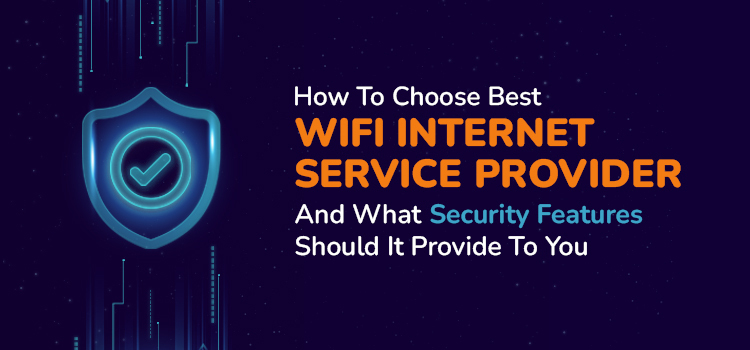How To Choose Best WiFi Internet Service Provider And What Security Features Should It Provide To You
While we all like using the fast internet for many purposes and purchasing plans with limitless WiFi internet services in Pune for our homes, many users today overlook Wi-Fi security. This is most likely due to a lack of understanding regarding security of WiFi services in Pune among users.
Clients’ lack of safety precautions and mindfulness has recently resulted in a variety of vengeful assaults that have caused significant harm to people and organizations. Before selecting the top WiFi Internet Services, it is critical to understand security details.
Let’s take a closer look at WiFi security features which an internet service provider should offer to its clients.
Know Everything About Security Before Opting For WiFi Internet Services In Pune
WiFi security from any wireless internet service provider in Pune is a major concern. You are continuously at risk of disclosing personal information, sharing sensitive information, and other information with hackers who may use it for illegal purposes. This necessitates enhanced security components and safeguards on your end.
But how can we secure WiFi internet services in Pune and select the best ISP and ensure that it is safe to use its internet services? Listed below are several methods for ensuring WiFi security:
- Wired Equivalent Privacy (WEP) is an encryption that cannot be trusted much. On the other hand, Wi-Fi Protected Access — WPA 2 and WPA 3 are two examples of extraordinary encryption. While WPA 3 is still in its early stages of adoption for a wider range of applications, you should opt for online access providers who use WPA 2.
WPA2 is the best option for getting your Wi-Fi connection. Make sure your wireless internet service provider in Pune provides you with the highest level of security.
- Make sure the ISPs keep records of which users connected when and from which IP address. This can be beneficial in a variety of ways. If the ISP logs all traffic on their servers on a regular basis, they can look for patterns in the logs. For example, if the logs revealed a huge number of connection attempts on an unused port, the administrator may suspect that the server was being scanned or compromised.
Also, if a dial-up user attempts multiple different passwords repeatedly, it could indicate that someone is attempting to guess a password. Of course, it’s possible that the user simply forgot their password; in either instance, a simple phone call should suffice.
- The “Transmission capacity” from your WiFi ISP is the number you see when comparing unlimited WiFi plans for home in Pune. The volume of data per unit of time that the transmission channel can maintain is the transfer speed of WiFi internet plans.
Certain clients get lucky and get fiber connections of over 1000 Megabits per second (Mbps), while some provincial businesses stick to 3 to 6Mbps DSL connections. Furthermore, just because the speed is advertised doesn’t mean that’s the speed you’ll get. From a security point of view, it’s always worth checking with nearby businesses to see what kind of speed you can realistically expect.
- The most important factor, especially for commercial clientele, is unwavering quality. It’s inconvenient and unhelpful to have a fickle web. If you operate in a sector where network connection disruptions are unavoidable, you should look for an ISP that offers a Service Level Agreement (SLA).
SLA’s services express exactly how dependable the organization should be. Client Services and unshakable quality are joined at the hip. Regardless of how amazing the association is, something will go wrong at some point.
Whether it’s withering equipment or a damaged line, it’s extremely likely that problems will arise at some point. Great customer service is proportional to how quickly they can get you back into action. Most businesses can’t afford to wait even a few days.
- While no system is ever completely infallible, service providers must do everything possible to guarantee that their network infrastructure is secure and difficult to hack.
If more than one rooting option is available, security managers must be cautious when deciding which routing destination is the most trustworthy. This necessitates ensuring that only authorized clients are able to make changes to their route registry. When examining a registry for signs of a breach, pay special attention to areas where excessive routing updates occur.
- Varied network and service providers have different system management practices and rules, which might impact attack risk. Separate systems for mail, news, and web hosting are required by industry standards, ensuring access is controlled while rigorous authorisation mechanisms are necessary through an encrypted link. Unauthorized mail relaying should be prevented by secured mail infrastructure.
Taking the lead in network security is no easy task. However, putting rules in place throughout the process of new subscriptions and monitoring all technical and legal processes on a regular basis might help to reduce network misuse and increase security.

